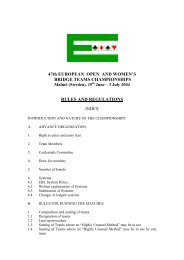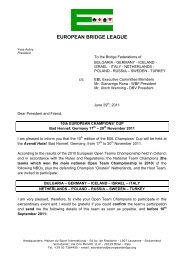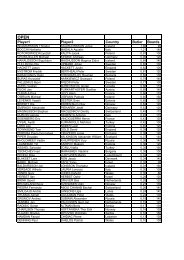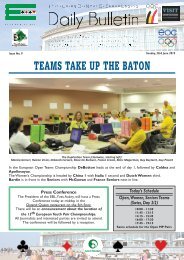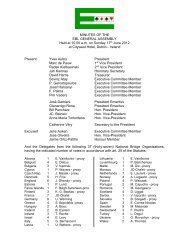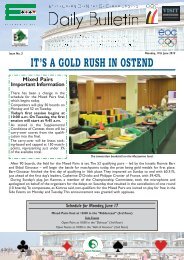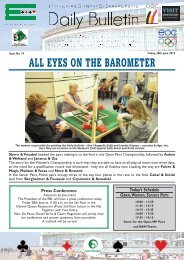Rules & Regulations - European Bridge League
Rules & Regulations - European Bridge League
Rules & Regulations - European Bridge League
Create successful ePaper yourself
Turn your PDF publications into a flip-book with our unique Google optimized e-Paper software.
LAW 73D:<br />
During the auction period, after an opponent has acted quickly, it is proper to adjust<br />
the tempo back to normal either by delaying one’s own call (place the bidding card<br />
faced, in front of, but not on the tray) or by waiting before passing the tray.<br />
A delay of the bidding tray on one side of the screen of up to 15 seconds (at any time<br />
during the auction and whether or not out of tempo) shall not normally give rise to<br />
any inference of unauthorized information. Players are strongly advised to vary the<br />
time the tray is passed so that pauses up to 15 seconds (or perhaps longer in<br />
unexpected situations) may be considered not to convey information.<br />
LAW 76:<br />
Spectators:<br />
Spectators may not sit so they can see on both sides of the screen.<br />
2. Alerting<br />
The EBL "Alerting Policy" applies.<br />
Any call which:<br />
(i) has a special or artificial meaning, or<br />
(ii) whose partnership meaning may not be understood by the opponents,<br />
is an “alertable” call which must be brought to the immediate attention of the<br />
opponents through the use of the "alert procedure"<br />
The "alert procedure" is as follows:<br />
A player who makes such a call alerts his screenmate by placing the alert card over<br />
the last call of the screen-mate, in his segment of the bidding tray; the alerted player<br />
must acknowledge by returning the alert card to his opponent.<br />
When the bidding tray is returned to their side of the screen both players are obliged,<br />
before either has made a further call, to alert their screen-mate if partner’s call is<br />
alertable; using the "alert procedure".<br />
It is the obligation of the player making an "alert" to ensure that his screen-mate has<br />
noticed that an "alert" has been made.<br />
A player can ask for an explanation of an opponent’s call. He does so by a written<br />
question to the opponent sitting on the same side of the screen. The opponent gives a<br />
written answer, regardless of whether the question concerned his own or his partner’s<br />
call.<br />
6 th <strong>European</strong> Seniors Teams Championship<br />
<strong>Rules</strong> & <strong>Regulations</strong><br />
18



